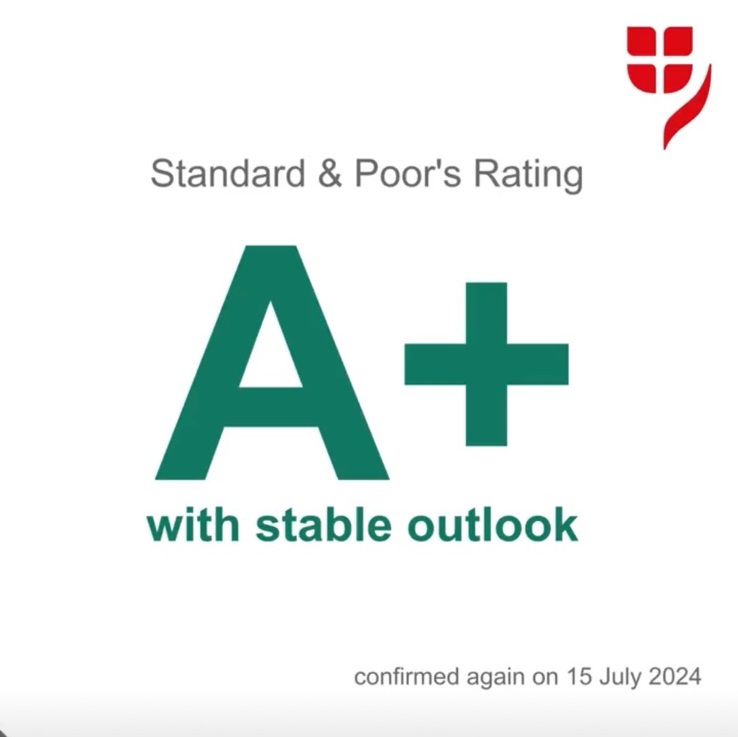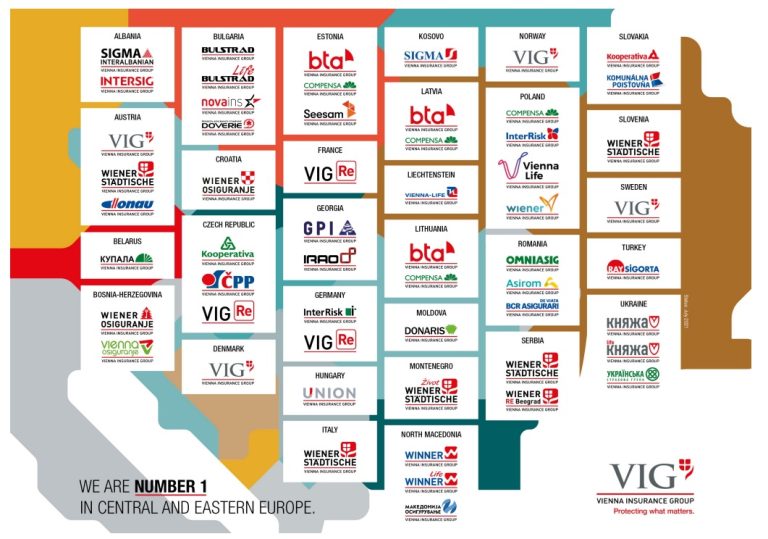
In times of crisis, the need for people to protect what they care about the most, themselves and their loved ones, intensifies. Therefore, I expect that inflation will not significantly affect the demand for life insurance products. Instead, we will emerge from the current situation even more successful and stable. The upward trend in all key performance indicators of Wiener Städtische Life Insurance Podgorica has continued in the first months of this year, characterized by double-digit growth in gross written premiums and more than doubled profits compared to the same period last year.
One of the major global challenges that the insurance market has faced after the Covid-19 pandemic is inflation, according to Andrija Pešić, the CEO of Wiener Städtische Life Insurance Podgorica, at the beginning of the interview for “Insurance World”.
“The current inflation rate is at its highest level in the last twenty years or more, and its impact on the insurance sector is not easy to measure. It can be said that inflation is, to some extent, both a friend and an enemy of insurance. In any case, I expect that the insurance sector will withstand this challenge in a quality and reliable manner and, just like in the case of the Covid-19 pandemic, identify opportunities for a new cycle of development after the stabilization of economic conditions,” says Pešić.
What are the consequences for life insurance?
The direct negative impact of inflation on life insurance can be observed through a weaker purchasing power of individuals and increased caution when purchasing new policies, resulting in reduced demand for new products. The weakening financial capacity of existing clients can lead to difficulties in premium payment and an increase in policy surrenders and terminations. Additionally, some policyholders may choose to surrender their policies due to their devaluation and invest the surrender value in potentially more profitable financial instruments. Despite the intention behind its implementation, indexing is not a sufficiently effective mechanism to fully protect the investment value in conditions of such high inflation.
Rising inflation is typically accompanied by an increase in interest rates on both the lending and deposit sides. This growth has both positive and negative effects on insurance companies. The rise in interest rates enables the investment of free funds at higher rates in the financial market, resulting in higher investment returns. On the other hand, the increase in interest rates affects the market value of existing investments, leading to a decrease in assets that guarantee the fulfillment of future obligations. Higher interest rates on loans increase the burden on borrowers and, therefore, limit their ability to purchase new life insurance policies.
Insurance companies need to establish readiness to respond to the impact of inflation on multiple levels, including improving sales through the redesign of existing products and continuous promotion, monitoring of claims and operating costs, digitalization, and upgrading the existing workforce.
Despite the aforementioned challenges, in times of crisis, there is an increased need for people to protect what they care about the most, themselves and their loved ones. Therefore, it is expected that inflation will not have a significant impact on the demand for life insurance, and we will emerge from the current situation even more successful and stable.
Is mixed life insurance still the most popular, or is there a growing demand for risk and other types of life insurance policies?
Traditional mixed life insurance has been losing its attractiveness among potential clients for several years. There are several reasons for this, with the main one being the continuous decrease in technical interest rates, present both in the region and throughout Europe for almost a decade. This has caused the guaranteed sum for survival to be lower than the total premium paid in most cases. The situation has been further worsened by the currently high inflation, which has devalued the mentioned guaranteed sum even more. On the other hand, the COVID-19 pandemic has brought the importance of health care and protection to the forefront, resulting in a significant increase in interest in supplementary risk coverage alongside life insurance. Taking into account these facts, our company has recognized the need to create new products that would combine the possibility of higher returns with adequate protection through a wide range of supplementary coverages.
“Are you feeling the impact of the economic crisis, what do the business results for the first five months of this year indicate? Have you achieved your plans?”
Despite numerous difficulties and challenges we have faced during this and previous years, we have achieved extraordinary results and surpassed planned targets. Although we are the most recent insurance company to enter the Montenegrin life insurance market, we managed to take a leadership position in terms of billed premium in 2022 with over a 35 percent market share. The best indicator of our success is that we delivered a record profit to policyholders last year, thus assuring them of the security of their investments. The trend of growth in all key business indicators has continued in the first months of this year, characterized by double-digit growth in gross billed premium and more than doubled profit compared to the same period last year. In this way, we have exceeded all the goals we set for ourselves.
Although the insurance market is still strongly influenced by inflation, as well as financial and war crises, we managed to reduce policy surrenders and cancellations compared to the previous period through effective claims management and improve efficiency in claims settlement. Additionally, by prudently investing free funds during the period of rising interest rates in the financial market, we have secured record financial income while maintaining financial strength and a high capital adequacy ratio. On the other hand, we have kept most of the expenses at the planned level, despite significant inflationary pressures.
The achieved results are certainly a result of the dedicated work of our professional team and constant focus on meeting the needs of clients who have recognized our company as a reliable partner in these uncertain times. If we take the first five months as a reference for forecasting, it can be said that we are heading towards the most successful year since the company’s establishment.
In the world, there are already examples of life insurance policies being sold online. What do you think about that?
The sale of insurance policies online is becoming an increasingly common and prevalent practice in many parts of Europe and the world. According to research conducted by a reputable Australian company, nearly 50% of policyholders consider the internet as the most important factor when deciding which type of insurance and insurance company to choose. For example, in the United Kingdom, over 35% of motor insurance premiums are generated through online sales. The majority of the population now uses the internet daily and spends an increasing amount of time online, making it commonplace to conduct financial transactions in this manner. The global trend of transitioning to digital business has been further accelerated by the COVID-19 pandemic, requiring insurance companies to be prepared to adapt and swiftly collect and analyze data in order to act quickly based on predictive analytics and insights.
However, when specifically discussing the sale of life insurance policies online, this type of sales approach does not yet follow global trends and is not currently present in Montenegro. Given the specific nature of life insurance compared to other types of insurance, the method of its sale, and especially considering the lack of adequate legal regulation and the need to harmonize multiple legal solutions (including the crucial Anti-Money Laundering and Counter-Terrorist Financing Act and detailed regulation of video identification of clients), it will require some more time for both clients and insurance agents/intermediaries to accept this sales method, even with the legislative framework in place. However, I believe that it is something that awaits us all in the near future, and Wiener Stadtische životno osiguranje AD Podgorica will be more than prepared to embrace such innovation.
When it comes to sales channels, you recently entered into a partnership with Crnogorska Komercijalna Banka. Which sales channels do you rely on the most in the future, and in that context, what growth potential do you see in bancassurance?
Our group, including our company in Montenegro, emphasizes multi-channel distribution as one of the fundamental principles of our business. This means that we do not prioritize any particular channel from the start, but rather the presence and extent of specific channels depend on the characteristics of individual markets. Specifically, our company in Montenegro has a well-developed internal sales network, collaborations with several agencies for representation and mediation, some of which we are exclusive partners with. Additionally, bancassurance is highly developed in the context of Montenegro. As much as possible, all channels are independent of each other, and we strive to strengthen and develop them equally. This is particularly important in such uncertain times, as one channel may encounter challenges in its operations, and it is crucial for the remaining channels to react effectively and contribute more to the successful operation of the company.
Regarding bancassurance, we have signed an agreement with Crnogorska Komercijalna Banka as their exclusive partner in selling life insurance policies. It’s worth mentioning that this bank is the largest in Montenegro based on several business parameters. However, it is important to note that we have had partnerships with the second and third largest banks, NLB and Erste Bank, respectively, for some time. We also have an exclusive partnership agreement with Erste Bank in selling life insurance policies, and there is a global partnership between our Austrian founders and the banking group. Recently, we signed a representation agreement with Lovćen Bank as well. In total, we have covered over two-thirds of the banking market in Montenegro, with a significant portion under exclusive partnerships.
What specific innovations is Wiener Städtische životno osiguranje Podgorica preparing for the market in Montenegro?
The development of life insurance services and products often follows changes in customer needs and preferences, as well as technological advancements and global economic circumstances. After the emergence of inflation and the reduction of technical interest rates in traditional life insurance products, we offered our clients a Unit-Linked life insurance product. Our company had the desire to introduce this product much earlier, but it was not possible due to inadequate legal regulations and a limited number of investment funds that met the regulatory requirements. Following positive changes in restrictive regulations at the end of the previous year, we began creating the Unit-Linked product and attracting existing and new investment funds. It is important to highlight that we received significant support in implementing the new program from our group and sister companies in the region, where this type of product has been present for some time and recognized as the most attractive product in those markets.
Therefore, we launched the product on June 1st, offering the market the opportunity for long-term investment in investment funds, with a guaranteed insured sum in the event of death and the option to contract all additional insurance coverage. This product allows our clients to invest in selected investment funds, including shares of renowned global companies and bonds from the most developed European countries. One aspect of particular pride during the development of this product is the fact that a significant portion of the investment in investment units goes into ESG funds, actively focusing on the planet, in line with one of our principles of creating economic value today without causing harm to future generations.
I firmly believe that banks are an excellent sales channel, but only if there is commitment and dedication to this business from both partners. However, this is something that is built over time, requiring patience from both sides and daily work on improving collaboration. With such participation from both partners, significant long-term benefits can be expected, both in terms of new premiums and portfolio stability. This portfolio is characterized by a significantly lower lapse rate compared to portfolios from other channels, partly because banks can actively monitor premium payments and partly because banks themselves are beneficiaries, i.e., assignees, in a significant portion of this portfolio, and they are particularly interested in ensuring regular premium collection.
The potential of this channel in Montenegro is truly significant, and as part of a group with extensive experience in bancassurance, we aim to maximize its utilization.
Usually, life insurance was purchased by family-oriented individuals. Is the situation changing, meaning are younger people becoming more of your clients? Do they have the financial potential to purchase these products, especially considering the emergence of various professions in recent years, from which young people are earning significant incomes?
We can say that the trend has been almost the same for many years. It is well known that life insurance is more popular among family-oriented individuals and those who have responsibilities towards others. This includes parents who want financial protection for their family in case of death or sudden incapacity to care for them. On the other hand, younger population tends to focus on resolving their housing situation, often through a mortgage, investing in their education and career, and then starting a family. Once they meet these criteria, they enter the category of individuals who acquire a sense of responsibility, creating the need for life insurance.
Certainly, young people have the financial potential, and while they may not recognize the need for traditional life insurance to a sufficient extent, we believe that they will be among the first to recognize and utilize the new type of insurance that we recently introduced, which involves investing in investment funds.
How do you think artificial intelligence will impact the insurance industry and how much can it help/hurt insurance?
Thinking about how to respond to you, I posed this question directly to artificial intelligence. The answer it provided initially made me laugh, but also made me reflect. In fact, its response was so precise and accurate that I could simply “copy” it, and probably no one reading it would even notice that the answer was actually generated by artificial intelligence. Considering these aspects, it is clear that AI has the potential to significantly impact not only people’s lives but also the operations of insurance companies, bringing numerous benefits to daily work (from “small” tasks like writing generic responses, emails, acknowledgment of various online requests, to processing large amounts of data, and more). However, it also poses several challenges, some of which are evident, while others may not be so apparent at the moment. It is particularly important to consider ethical issues, data privacy, and security, the potential impact on job positions, the reliability of the data we obtain, and the increasingly common misuse and proliferation of highly credible fake images and videos created through simple written instructions, which can later be used for various forms of fraudulent claims. Nonetheless, despite the numerous challenges that artificial intelligence will undoubtedly bring, I believe that the benefits it will provide to insurers and employees alike will outweigh the potential negatives of this rapidly approaching future.
What are the company’s future plans and what are its short-term goals?
Following VIG’s five-year strategy, our market is part of the group of markets expected to achieve significant premium growth, well above the market average, and increase market share based on written premiums. Despite consistently holding a leading position in terms of premiums for over a year, we believe that further strengthening our market share is possible and that is our main plan for the future. Diversification of our products and sales channels, constant product innovations, often revolutionary for our market, and accelerated digitalization give us the confidence that we will continue to fulfill this primary task. We also expect to continue delivering excellent investment results, which will ultimately facilitate the achievement of our financial goals in the current and future years. As for specific products, we believe that our Unit-linked product will soon become the best-selling life insurance product in Montenegro.
In the near future, we are also expecting to move to new business premises by the end of summer. The dynamic growth and development of the company, product and sales diversification, all of this has led us to consider a change of address for some time now, to be even closer to our clients and key sales partners. This will be a significant step forward in the development of our company, and we firmly believe it will provide a new impetus to achieving our future development goals.


